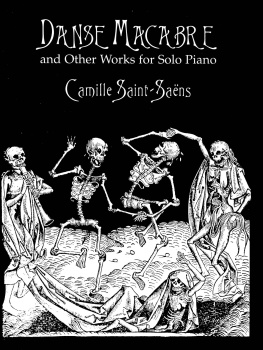Camille Saint-Sans
Musical Memories
Published by Good Press, 2022
EAN 4064066120474
Table of Contents
Chapter I
Memories of My Childhood
In bygone days I was often told that I had two mothers, and, as a matter of fact, I did have twothe mother who gave me life and my maternal great-aunt, Charlotte Masson. The latter came from an old family of lawyers named Gayard and this relationship makes me a descendant of General Delcambre, one of the heroes of the retreat from Russia. His granddaughter married Count Durrieu of the Acadmie des Inscriptions et Belles-Lettres. My great-aunt was born in the provinces in 1781, but she was adopted by a childless aunt and uncle who made their home in Paris. He was a wealthy lawyer and they lived magnificently.
My great-aunt was a precocious childshe walked at nine monthsand she became a woman of keen intellect and brilliant attainments. She remembered perfectly the customs of the Ancien Rgime, and she enjoyed telling about them, as well as about the Revolution, the Reign of Terror, and the times that followed. Her family was ruined by the Revolution and the slight, frail, young girl undertook to earn her living by giving lessons in French, on the pianofortethe instrument was a novelty thenin singing, painting, embroidery, in fact in everything she knew and in much that she did not. If she did not know, she learned then and there so that she could teach. Afterwards, she married one of her cousins. As she had no children of her own, she brought one of her nieces from Champagne and adopted her. This niece was my mother, Clemence Collin. The Massons were about to retire from business with a comfortable fortune, when they lost practically everything within two weeks, in a panic, saving just enough to live decently. Shortly after this my mother married my father, a minor official in the Department of the Interior. My great-uncle died of a broken heart some months before my birth on October 9, 1835. My father died of consumption on the thirty-first of the following December, just a year to a day after his marriage.
Thus the two women were both left widows, poorly provided for, weighed down by sad memories, and with the care of a delicate child. In fact I was so delicate that the doctors held out little hope of my living, and on their advice I was left in the country with my nurse until I was two years old.
While my aunt had had a remarkable education, my mother had not been so widely taught. But she made up for any lack by the display of an imagination and an eager power of assimilation which bordered on the miraculous. She often told me about an uncle who was very fond of herhe had been ruined in the cause of Philippe Egalit. This uncle was an artist, but he was, nevertheless, passionately fond of music. He had even built with his own hands a concert organ on which he used to play. My mother used to sit between his knees and, while he amused himself by running his fingers through her splendid black hair, he would talk to her about art, music, paintingbeauty in every form. So she got it into her head that if she ever had sons of her own, the first should be a musician, the second a painter, and the third a sculptor. As a result, when I came home from the nurse, she was not greatly surprised that I began to listen to every noise and to every sound; that I made the doors creak, and would plant myself in front of the clocks to hear them strike. My special delight was the music of the tea-kettlea large one which was hung before the fire in the drawing-room every morning. Seated nearby on a small stool, I used to wait with a lively curiosity for the first murmurs of its gentle and variegated crescendo, and the appearance of a microscopic oboe which gradually increased its song until it was silenced by the kettle boiling. Berlioz must have heard that oboe as well as I, for I rediscovered it in the Ride to Hell in his La Damnation de Faust.
At the same time I was learning to read. When I was two-years-and-a-half old, they placed me in front of a small piano which had not been opened for several years. Instead of drumming at random as most children of that age would have done, I struck the notes one after another, going on only when the sound of the previous note had died away. My great-aunt taught me the names of the notes and got a tuner to put the piano in order. While the tuning was going on, I was playing in the next room, and they were utterly astonished when I named the notes as they were sounded. I was not told all these detailsI remember them perfectly.
I was taught by Le Carpentiers method and I finished it in a month. They couldnt let a little monkey like that work away at the piano, and I cried like a lost soul when they closed the instrument. Then they left it open and put a small stool in front of it. From time to time I would leave my playthings and climb up to drum out whatever came into my head. Gradually, my great-aunt, who fortunately had an excellent foundation in music, taught me how to hold my hands properly so that I did not acquire the gross faults which are so difficult to correct later on. But they did not know what sort of music to give me. That written especially for children is, as a rule, entirely melody and the part for the left hand is uninteresting. I refused to learn it. The bass doesnt sing, I said, in disgust.
Then they searched the old masters, in Haydn and Mozart, for things sufficiently easy for me to handle. At five I was playing small sonatas correctly, with good interpretation and excellent precision. But I consented to play them only before listeners capable of appreciating them. I have read in a biographical sketch that I was threatened with whippings to make me play. That is absolutely false; but it was necessary to tell me that there was a lady in the audience who was an excellent musician and had fastidious tastes. I would not play for those who did not know.
As for the threat of whippings, that must be relegated to the realm of legends with the one that Garcia punished his daughters to make them learn to sing. Madame Viardot expressly told me that neither she nor her sister was abused by their father and that they learned music without realizing it, just as they learned to talk.
But in spite of my surprising progress my teacher did not foresee what my future was to be. When he is fifteen, she said, if he can write a dance, I shall be satisfied. It was just at this time, however, that I began to write music. I wrote waltzes and galopsthe galop was fashionable at that period; it ran to rather ordinary musical motives and mine were no exception to the rule. Liszt had to show by his Galop Chromatique the distinction that genius can give to the most commonplace themes. My waltzes were better. As has always been the case with me, I was already composing the music directly on paper without working it out on the piano. The waltzes were too difficult for my hands, so a friend of the family, a sister of the singer Geraldy, was kind enough to play them for me.
I have looked over these little compositions lately. They are insignificant, but it is impossible to find a technical error in them. Such precision was remarkable for a child who had no idea of the science of harmony. About that time some one had the notion that I should hear an orchestra. So they took me to a symphony concert and my mother held me in her arms near the door. Until then I had only heard single violins and their tone had not pleased me. But the impression of the orchestra was entirely different and I listened with delight to a passage played by a quartet, when, suddenly, came a blast from the brass instrumentsthe trumpets, trombones and cymbals. I broke into loud cries, Make them stop. They prevent my hearing the music. They had to take me out.



